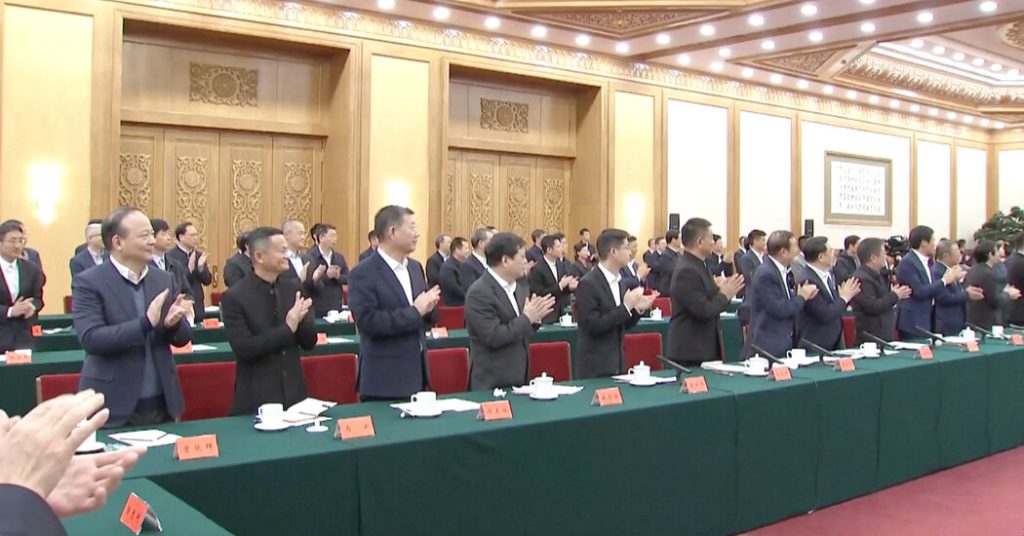Summarize this content to 2000 words in 6 paragraphs When Beijing sidelined Jack Ma, China’s most prominent entrepreneur, by slamming the brakes on his business in 2020, it sent an unmistakable message that no company was above the Chinese Communist Party.On Monday, China’s top leader, Xi Jinping, tried out a different approach.Mr. Xi met with corporate chieftains, including Mr. Ma, who has largely kept out of the public eye for the past four years, in a show of support at an economically precarious time.The heads of the electronics companies Huawei and Xiaomi, the battery maker CATL and the electric vehicle giant BYD were among the business leaders who applauded and took notes as Mr. Xi presided over the meeting, according to a video published by state media. The reports did not describe the nature of the discussions or list everyone who attended, but noted that Mr. Xi listened to the concerns of the executives.It was the first gathering between Mr. Xi and corporate leaders since President Trump targeted China in a series of tariffs, which he said were aimed at reducing the enormous American trade deficit with the country. The tariffs add to a growing list of threats to China’s economy, on top a property crisis, falling prices and fragile consumer sentiment.The private sector has taken a back seat under Mr. Xi, who has put greater emphasis on state-owned enterprises in a drive for Chinese self-reliance. Reports over the weekend that Mr. Xi might meet with top business leaders had sparked optimism among investors that Beijing might change tack.Stocks in Hong Kong, where many major Chinese companies trade, have risen in recent weeks, driven in large part by news that DeepSeek, a Chinese start-up, had built a powerful artificial intelligence program using fewer computer chips than any Silicon Valley giant. Liang Wenfeng, the founder of DeepSeek, was at the meeting on Monday, according to Chinese media.On Monday, the Hang Seng Index in Hong Kong initially rallied but finished the day down slightly. Stocks in mainland China rose about 0.25 percent.The summit was one of the top topics of discussion on Weibo, a popular online platform in China, on Monday.For many, the most important question ahead of the meeting was whether Mr. Ma, the Alibaba Group founder, would be in attendance.It was the first time Mr. Ma had been seen in public with Mr. Xi since the government intervened to stop the $34 billion initial public offering of Mr. Ma’s Ant Group in 2020, after the executive publicly criticized Chinese regulators for stifling innovation. The move by regulators to stop what would have been the world’s biggest I.P.O. was a key development in a multiyear government crackdown on Chinese entrepreneurs. Mr. Ma has kept largely out of the public eye since then.Fred Hu, founder of the investment firm Primavera Capital in Hong Kong, called Monday’s meeting a symbolic “course correction.”“In recent years the private sector has been hit by policies, politics and regulations,” he said.Mr. Ma’s attendance sent a message “that successful private entrepreneurs will be respected rather than penalized,” Mr. Hu added.Alibaba did not respond to a request for comment.While Mr. Xi’s outreach was filled with hopeful symbolism, it was not clear that it would result in substantive change for companies or help address China’s broader economic woes.Mr. Xi rounded up the heads of corporate China at a splashy meeting in 2018, where he emphasized the Communist Party’s support of private companies and pledged “this will not change one bit.”Not long after, Beijing began to crack down on private business, rolling out regulations to curb property financing, private tutoring companies, perceived corruption in health care and pay practices financial services. In its campaigns, the party has cut off funding from state-owned banks, banned companies and detained some of China’s most famous executives and tycoons.Local governments saddled with debt have taken to fining private businesses and households and even detaining executives to drum up extra cash.This practice has fueled a sense of insecurity among ordinary people about their financial wealth and future, said Chen Zhiwu, a finance professor at the University of Hong Kong.Last week, China’s head of economic crime prosecutions said that the government was working to “rectify profit-driven law enforcement.”But experts said Beijing will need to do more to increase investment by Chinese companies and foreign businesses if it wants to create jobs and spur consumer spending. Its biggest gesture in recent months was the announcement of a $1.4 trillion plan to bail out local governments, a plan many economists said was not bold enough.Not even Mr. Ma’s return to the spotlight may be enough to address lingering concerns.“At the end of the day the reality is that the private business sector in China is only of value when the party needs some growth or needs to stabilize the economy,” said Mr. Chen.“Once the economy is stabilized, the private business owners would be thrown into the trash can once again.”Li You contributed research.
Keep Reading
Subscribe to Updates
Get the latest creative news from FooBar about art, design and business.
© 2025 Globe Timeline. All Rights Reserved.


